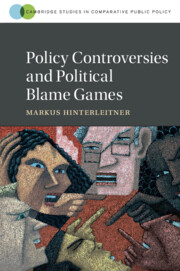4 results

The Politics of Comprehensive School Reforms
- Cleavages and Coalitions
-
- Published online:
- 18 August 2022
- Print publication:
- 25 August 2022
-
- Book
-
- You have access
- Open access
- Export citation
1 - How Political Systems Manage Their Policy Controversies
-
- Book:
- Policy Controversies and Political Blame Games
- Published online:
- 30 October 2020
- Print publication:
- 12 November 2020, pp 1-17
-
- Chapter
-
- You have access
- Open access
- HTML
- Export citation

Policy Controversies and Political Blame Games
-
- Published online:
- 30 October 2020
- Print publication:
- 12 November 2020
-
- Book
-
- You have access
- Open access
- Export citation
Introduction
-
- Book:
- Sovereignty in the South
- Published online:
- 19 October 2019
- Print publication:
- 24 October 2019, pp 1-33
-
- Chapter
- Export citation

